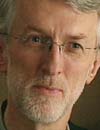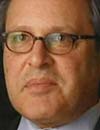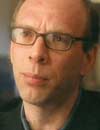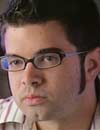- Lucy Dalglish
Executive director, The Reporters Committee for Freedom of the Press - John Hinderaker
Blogger, Power Line - Jeff Jarvis
Blogger, BuzzMachine - Nicholas Lemann
Dean, Columbia University School of Journalism - Jay Rosen
Blogger; Professor, New York University - Josh Wolf
Blogger, The Revolution Will Be Televised
I think the news organizations have come to some sort of agreement on who should be covered. We've spent a lot of time working on that. When you go up to Congress, they throw out at you -- and Judge [David] Sentelle in the Wen Ho Lee and the Plame cases just kept saying, "You mean to tell me these bloggers should be covered, too?"
The answer is some bloggers are journalists, and some aren't. But we have some guidance in federal case law, starting with a case called von Bulow [v. von Bulow], and that was in the [2nd] Circuit. And yes, it was the von Bulow case, but there was a situation in which Claus von Bulow's girlfriend was asked to testify and identify some information she did not want to give up. She said: "I gathered that information to write a book. Those are my confidential sources. I don't have to reveal them."
The court did what we call a function analysis and said when you're trying to decide whether someone should be covered by a privilege, such as a reporter's privilege, you look at what they were doing at the time they had the conversation. At the time they had the conversation with the source, did they represent themselves to be a journalist? Did the source understand them to be doing a story of some sort? And was there intention all along to publish it or broadcast it or disseminate it to the public in some way?
In that case the court, the [2nd] Circuit, said she had no intention of doing that when she collected the information; therefore she's not a journalist, privilege does not apply to her. That same test has been used in a number of circuits across the country, and that's the test that we've been advocating that Congress use in trying to decide whether or not someone is covered by the privilege. Even if the description in any statute we come up with is vague, I think they will go to that von Bulow function test to make that decision. ...
Do you consider yourself a journalist?
I have never lost a minute of sleep worrying about whether I'm a journalist or not. I guess I would say no, we're not journalists.
What we do is commentary on the news, and we occasionally do something that's very close to primary news reporting. But mostly what we do is commentary and analysis. I don't really think of myself as a journalist or a part-time journalist. ...
Doesn't it make the term journalism almost meaningless? I'm a teenager and I'm walking down the street and taking pictures on my phone, that's an act of journalism?
Sure, if you're finding out something that the world doesn't know and wants to know and you tell them? Yes. Why does it have to be the exclusive purview of somebody who has a job and a suit and a tie and a notebook? That's ridiculous.
So you have to send the picture to someone else to be journalism?
Motive matters, sure. Not all bloggers want to be journalists. The Pew [Internet and American Life Project] recently did a survey and found that 33 percent of bloggers think they're doing anything related to journalism. The rest are just people talking, and that's how I define blogs: Blogs are people talking. They are your constituents; they're your customers, and if you don't listen to them, you're a damn fool.
But then above that, yes, some people do choose to do journalism. They find out something and they report that to the world and they do it accurately and to do it fairly and they do it completely and you can have the exact same standards as a journalist. ...
Well, tell me, what is a journalist?
We're not a licensed profession. A journalist is anybody who says he's a journalist. People who write astrology columns are journalists. People who write race-tip columns are journalists. Pipe-puffing op-ed page reporters are journalists. Photographers who go to war zones are journalists. Arguably people who write comic strips are journalists. Bloggers are journalists. I don't think it's useful at all to get into the game of saying who is and isn't a journalist. Basically anybody who says they're a journalist is a journalist.
So why would you bother spending tens of thousands of dollars to go to the journalism school you run if you can be a journalist without doing that?
What we are training people to do is to get paid jobs, although some of our graduates go out and become entrepreneurial and start news organizations.
A lot of them just go into public relations.
No, almost none go into public relations. We don't let public relations agencies even recruit here. This is one of the few pure journalism schools in the country. Why we exist: we train people basically to be reporters. That is a subcategory of journalists. It means people who go out and actively seek information, we hope, as a full-time occupation. Because it's full-time, it probably needs to be paid, and because it needs to be paid, they want to work for news organizations.
But basically you agree with [media critic/blogger] Jeff Jarvis that anyone can perform an act of journalism?
Oh, yeah. Anybody who does anything that offers any sort of information, comment, humor, etc., on the passing parade of life is notionally a journalist.
Are bloggers journalists?
My opinion is that people who write blogs do things that are journalistic all the time, and lots of it isn't. We really shouldn't oppose these things to one another. They are actually going to end up working together much more than they are going to be at loggerheads. I've tried to follow those principles myself in exploring the blog revolution as a blogger. But I think this bloggers-versus-journalists drama is way overdone. It's just kind of the way professional journalists react to things. ...
It doesn't mean that professionals are going away or they're going to be replaced by troops of citizen journalists. I've never said that; I don't believe it. But the picture has changed a lot. The monopoly that they once had, they don't have anymore. They just have to change and adjust to new conditions that are coming about every day.
But there are some people who are advocates for blogging, if you will, but they call it "citizen journalism." They believe that the wisdom of the crowd is superior to what has traditionally gone on [in the mainstream media].
That's not really what they're saying, no. That's what a professional journalist might hear them saying. The wisdom of the crowd is more like this: Have you ever noticed that the most e-mailed articles on the site can be interesting and cause you to discover stuff that are kind of fresh and new? It's like what a lot of people do actually has some information in it, and it's a lot easier for us today to record the choices of what lots of people do. And if we look at that and say, "What is there?" that's what people mean by the wisdom of the crowd.
Now, what a professional journalist hears when they say that is they immediately add 10 reflex reactions where they associate that to market research and giving people what they want, and all of the sudden you've lost all professional autonomy, and you're just catering to people's whims and desires. ... That's what it seems like, but it's not. ... There are certain situations in which group intelligence can be tapped. It's not a replacement for this or that; it's just a new development.
Let me read to you from the California shield law. It says that to qualify under the California shield law, you've got to be "a publisher, editor, reporter or other person connected with or employed by a newspaper, magazine or other periodical publication, or by a press association or a wire service, or any person who is so connected or so employed." Are you any of those things?
Well, one of them that you read was publisher. I don't know what the legal definition of publisher is, but to me, anyone who maintains a blog for news-gathering purposes is a de facto publisher by taking it upon themselves to be their own publisher.
The video that was used of this protest was purchased, or the rights [to] it were purchased, by several television news outlets, so to that end I am connected to these organizations as a free-lance stringer/photographer if you will. In the case of Apple v. Think Secret, the California Court of Appeals ruled that bloggers are considered journalists because it's not the court's place to decide what is and isn't a real journalist. Based on the California Court of Appeals' ruling, I certainly qualify [under] the California shield law, and I probably do on other reasons as well. …
Predominantly I'm a journalist who works as a volunteer journalist to get the word out on my Web site. I'm a free-lance person second to being my own publication, which is The Revolution Will Be Televised. To that extent, to say that I'm not a journalist because I don't get paid, you have to kind of hearken back to the First Amendment and when it was written.
One of the critiques about me not being a journalist is that I'm not objective. It's pretty clear what my politics are. But back when the First Amendment was written, when we guaranteed a free press, there was no such thing as objective journalism. It was only after Hearst and all the yellow journalism that created this scandal that we came up with journalism schools, that the idea of fair and balanced was around.
When the First Amendment was composed, if you wanted fair and balanced, you read the Federalist newspaper, you read the anti-Federalist newspaper, and then you balanced them yourself and decided what was appropriate. These pamphleteers and journalists like this didn't often work for large organizations. So in today's culture, it may be difficult to see me as a journalist. But I think in the 1790s, if there were blogs, they'd surely consider myself to be a journalist and covered under the First Amendment.
![News War [site home page]](../art/p_title.gif)













